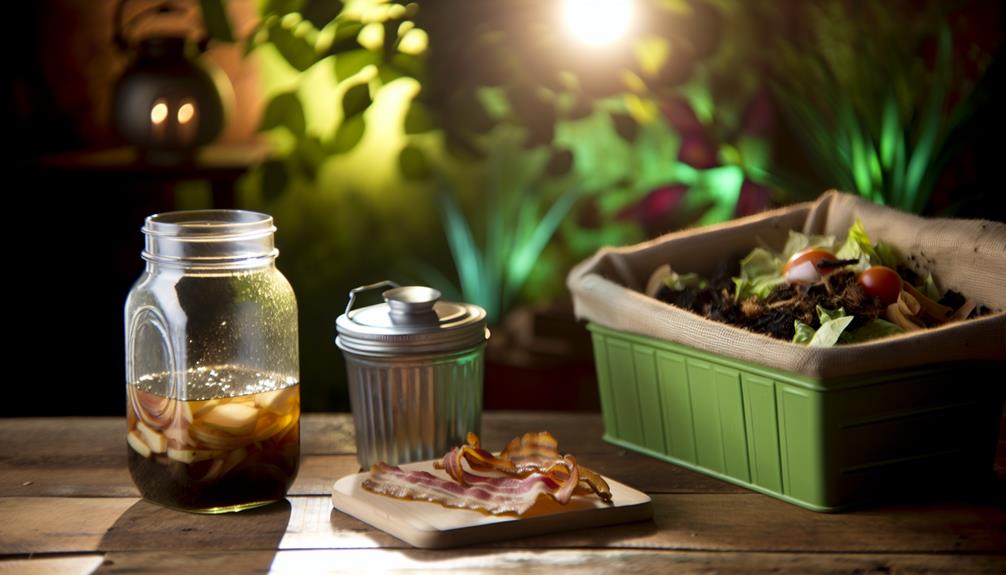

You can compost bacon grease, but it’s challenging and requires careful management. Bacon grease can attract pests and produce strong odors, disrupting the composting process. To mitigate issues, mix small amounts of grease with absorbent materials like sawdust and make sure the compost pile is well-aerated.
Regularly turn the pile and closely monitor moisture levels to prevent it from becoming too wet. Alternatively, consider reusing bacon grease in cooking, making homemade bird feeders, or creating fire starters. For those new to composting or concerned about balance, exploring other methods might be beneficial. There’s more to discover about managing kitchen waste effectively.
Composting is a natural process that turns organic waste into valuable, nutrient-rich soil. To get started, you’ll need a balance of green materials like vegetable scraps and brown materials such as dry leaves. Greens provide nitrogen, while browns supply carbon, both essential for decomposition. Aim for a ratio of roughly three parts browns to one part greens.
You’ll also need moisture and oxygen. Keep your compost pile damp, but not soaking wet, and turn it regularly to introduce air, which speeds up the breakdown process. Avoid adding meat, dairy, or oils, as they attract pests and can smell unpleasant.
Bacon grease, a byproduct of cooking bacon, is a type of fat that can pose unique challenges when it comes to composting. It’s a dense, greasy substance that doesn’t break down easily in a typical compost pile.
Unlike vegetable scraps or yard waste, bacon grease can hinder the composting process by creating an imbalanced environment. It can attract pests like rodents and insects, and it may also produce unpleasant odors. Additionally, the high fat content can slow down the decomposition of other materials in your compost.
To manage these issues, you need to understand how bacon grease interacts with the composting process and consider alternative methods for disposal or incorporation into your composting system.
Composting bacon grease can enrich your soil with essential nutrients, making your garden thrive.

It also helps reduce kitchen waste, turning what would be trash into valuable compost. Additionally, incorporating grease can enhance the overall quality of your compost, resulting in a more effective, nutrient-rich end product.
By adding bacon grease to your compost, you can greatly enhance the nutrient content of the soil. Bacon grease is rich in fats, which break down into essential nutrients that plants crave. When used correctly, it can substantially boost soil fertility. Here’s a quick overview of the benefits:
| Nutrient | Benefit | Source |
|---|---|---|
| Nitrogen | Promotes leafy growth | Protein in grease |
| Phosphorus | Strengthens root development | Fat breakdown |
| Potassium | Enhances overall plant health | Natural oils |
Ensure you mix the grease well with other compost materials to help it decompose efficiently. Too much grease can slow down the composting process, so use it sparingly. Keep your compost balanced and reap the benefits of nutrient-rich soil.
Turning your leftover bacon grease into compost can greatly reduce kitchen waste. Instead of tossing it into the trash, you’re repurposing a kitchen byproduct that would otherwise contribute to landfill mass. This simple change can make a significant difference over time.
Collect your bacon grease in a container and mix it with other compostable materials like vegetable scraps and coffee grounds. Just remember to use it sparingly, as too much grease can disrupt the composting process.
Although it might seem counterintuitive, adding small amounts of bacon grease to your compost can enrich the soil with additional nutrients and beneficial microorganisms.
When you incorporate a tiny bit of grease, you’re providing a source of fat that microorganisms can break down, enhancing the microbial activity in your compost pile. To do this effectively, ensure you mix the grease well with other compost materials like dried leaves or cardboard to prevent it from clumping.
Keep the amount minimal—too much grease can create a sticky, smelly mess and disrupt the composting process.
Adding bacon grease to your compost pile can attract pests and create unpleasant odors. The scent of grease can draw rodents, raccoons, and insects, which can disrupt your composting process and create a mess. Additionally, grease doesn’t break down easily; it can form a slimy layer that restricts airflow. This anaerobic condition slows down decomposition and can result in a foul smell.
The high fat content also alters the moisture balance of your compost, making it overly wet and potentially sludgy. Furthermore, excessive quantities of grease can introduce harmful pathogens, impacting the health of your compost. To guarantee a successful composting experience, it’s important to be aware of these potential drawbacks when considering adding bacon grease.
To compost grease effectively, you’ll need to follow specific guidelines that mitigate its potential drawbacks.

First, always mix the grease with absorbent materials like sawdust, shredded paper, or straw; this helps prevent clumping and speeds up decomposition.
Second, add small amounts of grease at a time to maintain the balance in your compost pile. Too much can disrupt the microbial activity necessary for composting.
Third, guarantee your compost pile is well-aerated. Turn it regularly to provide oxygen, which helps break down the grease.
Finally, monitor the moisture levels closely. Grease can make your compost too wet, so balance it with dry materials as needed.
If composting bacon grease seems too complicated, there are several other eco-friendly ways to dispose of it. One option is to reuse it in cooking. Bacon grease can add flavor to dishes like roasted vegetables or scrambled eggs. Simply store it in a sealed container in your fridge.
Another method is to create a DIY bird feeder. Mix the grease with seeds and let it harden in a mold. Birds will appreciate the high-fat treat, especially in winter.
Lastly, consider using it for homemade fire starters. Soak cotton balls in the grease and store them in a sealed bag. These make excellent, long-burning fire starters for your fireplace or campfire.
While you can compost bacon grease, it’s generally not recommended due to potential drawbacks like attracting pests and slowing down composting. If you choose to compost it, do so sparingly and mix it well with other materials.
Alternatively, consider reusing bacon grease for cooking or disposing of it in the trash. Always prioritize maintaining a balanced and healthy compost pile for the best results.
Follow these guidelines to guarantee effective and efficient composting.
